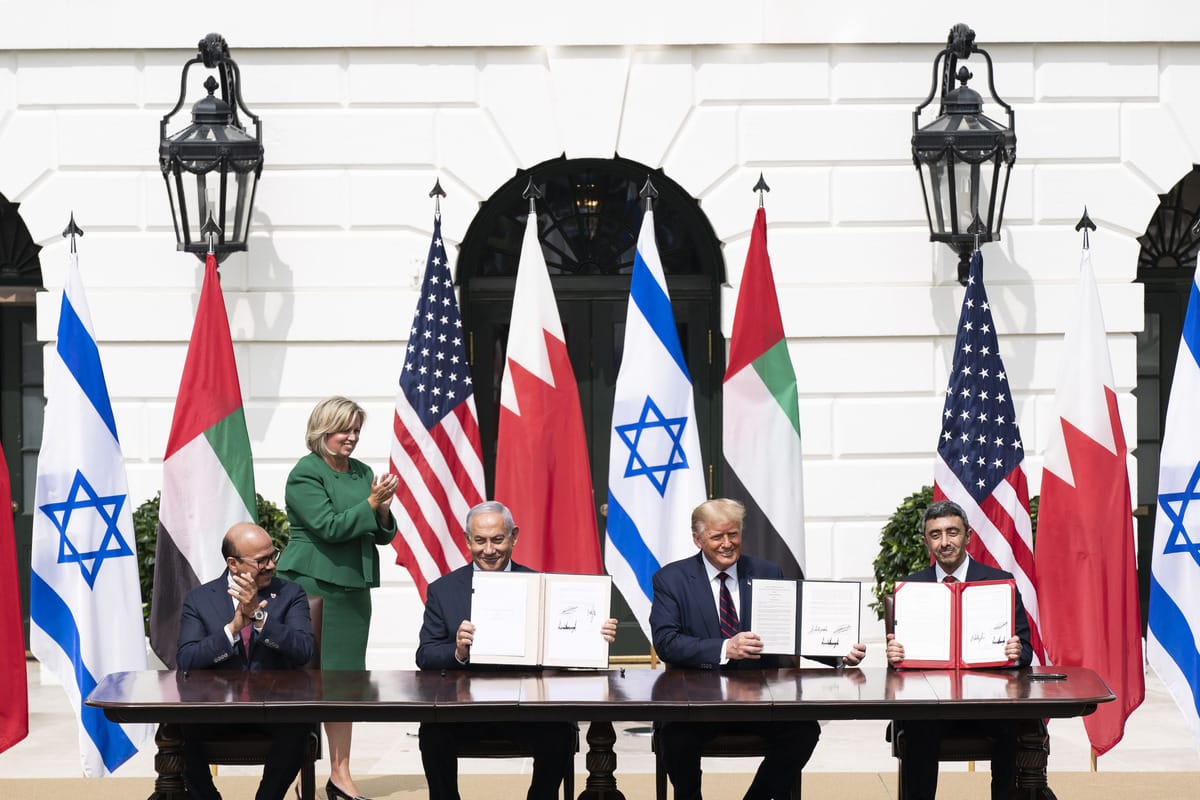UAE Normalisation with Zionist Israel: A breakdown

By Clayton Barrington-Russell, BA Arabic and International Relations
In a historic move described as ‘A treacherous stab in the back’ by Palestinians, the United Arab Emirates and Bahrain formally signed a deal ‘normalising’ relations with Israel on 15 September. This involves increased cooperation regarding security, healthcare, tourism, and trade in exchange for the ‘suspension’ of Israeli Prime Minister Benjamin Netanyahu’s promise of annexing the Jordan Valley – the fertile heartland of the future Palestinian State.
On Monday 12 October, the first shipment of cargo arrived in the occupied city of Haifa from Jebel Ali Port, Dubai. Just a few months ago this would have been inconceivable, yet this presents one of the first steps towards a full-fledged economic partnership between two of the most prominent economies in the Middle East. This follows the first-ever commercial flight from occupied Palestine to the Emirates in August.
The occasion was marred by protests in opposition to the deals in the West Bank cities of Nablus, Hebron, and Jenin, as well as in Gaza and across the world. A spokesperson for the Palestinian Authority referred to it as a ‘betrayal of the Palestinian Cause,’ while Palestinian political parties Fateh and Hamas were united in their condemnation.
Traditionally firm backers of Palestine, it is alleged that Saudi and Emirati officials have had secret cooperation with Israel in recent years, due to their mutual distaste of Iran’s nuclear deal. Economically, both Israel and the UAE will benefit from the new deal, with increased Emirati investment in Israeli technology and the reported future opening of a direct shipping route from Jebel Ali Dubai to the occupied port of Eliat. However, this economic growth will come at a huge cost – Palestinian lives.
Regardless of the motives, the so-called ‘Abraham Accords’ are an extremely risky attempt at political theatre. The timing of the deal is significant, generating support for Netanyahu after he failed to form a government twice last year. The US election is to be held in November, and, in the eyes of the Trump administration, a meaningless ‘peace agreement’ between two allies of the US will demonstrate to the average American voter the diplomatic skills of the President.
Nevertheless, continued support of the Israeli regime will result in further breaches of international law, such as the recognition of the occupied Golan Heights as sovereign Israeli territory in March last year. The hypocrisy of this deal has exposed the Zionist narrative now more than ever.
As for the Emirati and Bahraini ruling elite, normalising relations with Israel will come with its own dire consequences. Directly undermining the 1967 Khartoum Resolution remains hugely unpopular amongst the general population of the Gulf, where Arab League members previously agreed upon the Three Nos: ‘No peace with Israel; no recognition of Israel and no negotiations with Israel.’ Public opposition to the recent thawing of relations may be limited due to the nationwide ban on ‘political demonstrations,’ although an Emirati petition condemning the recent deal has racked up over a million signatures online. With over 100,000 Palestinians living in the Emirates beforehand, the authorities risk a hostile response to the normalisation.For the 2 million Palestinians under siege in Gaza, 3 million in the West Bank, and countless more in the diaspora, the normalisation deal effectively rewards the Israeli regime for their crimes and continued illegal occupation. As native Palestinians are yet again barred from worshipping at Jerusalem’s holy sites, a visit of pro-normalisation Gulf Arabs to Al Aqsa Mosque a month almost seems like mockery. For Palestinians home and abroad, the future looks more uncertain than ever.
Photo Caption: Minister of Foreign Affairs of Bahrain Dr. Abdullatif bin Rashid Al-Zayani, Israeli Prime Minister Benjamin Netanyahu, U.S. President Donald J. Trump, and Minister of Foreign Affairs for the United Arab Emirates Abdullah bin Zayed Al Nahyan signing the Abraham Accords at the White House, September 15, 2020. Credit: Shealah Craighead, Flickr.



